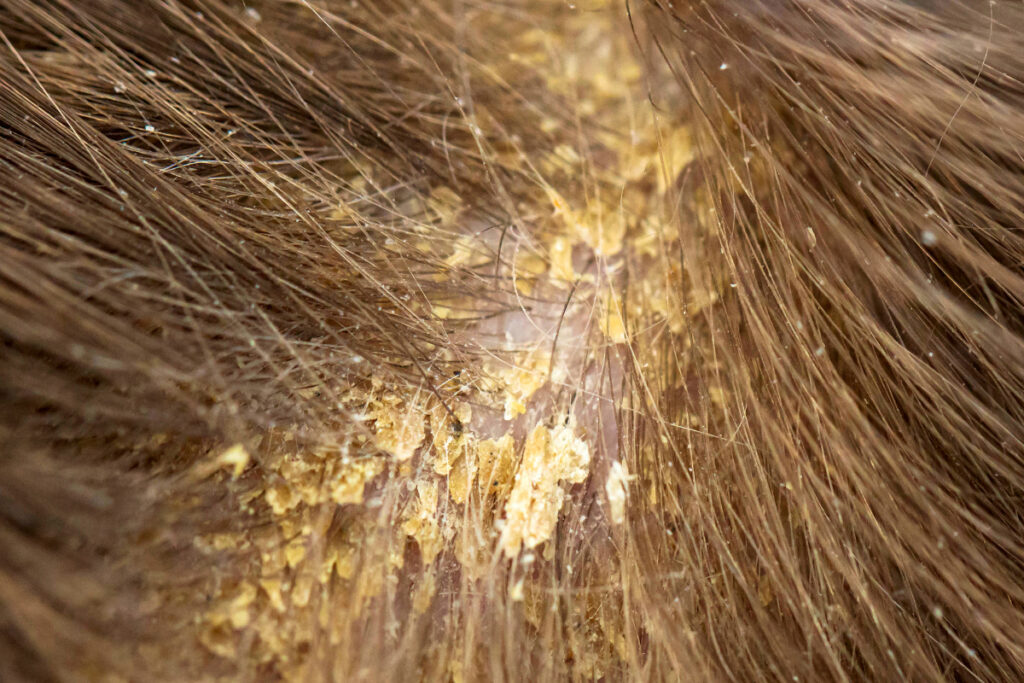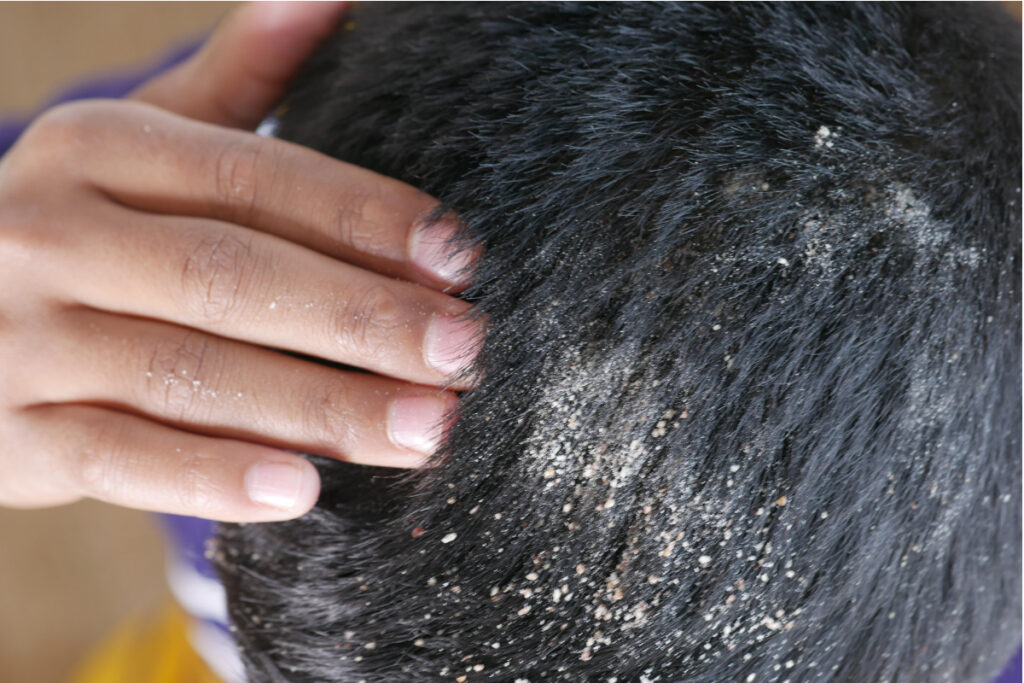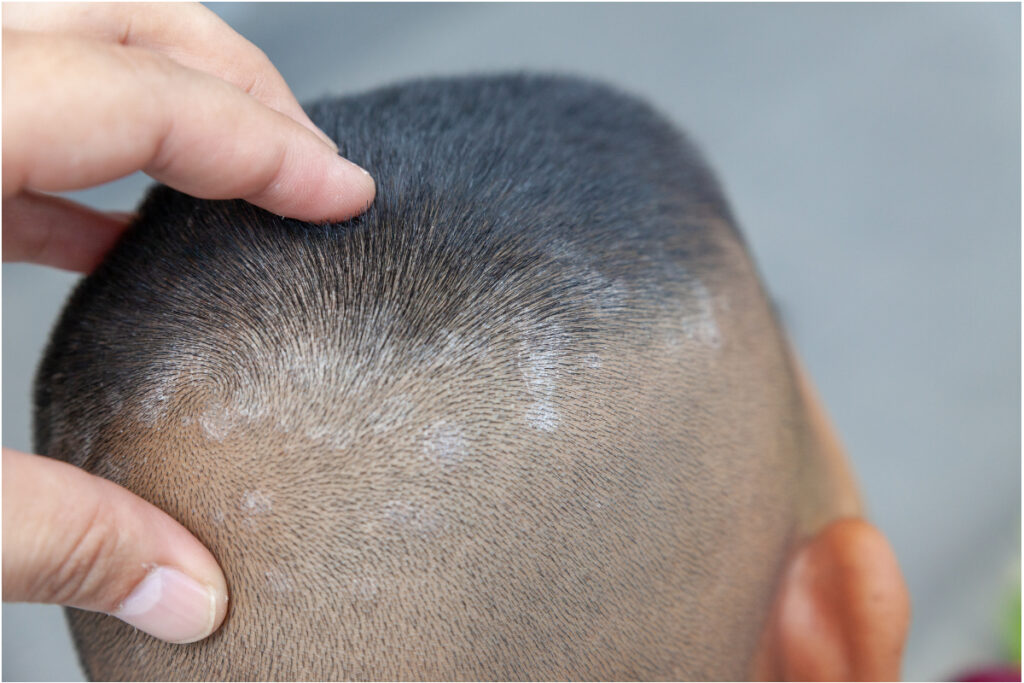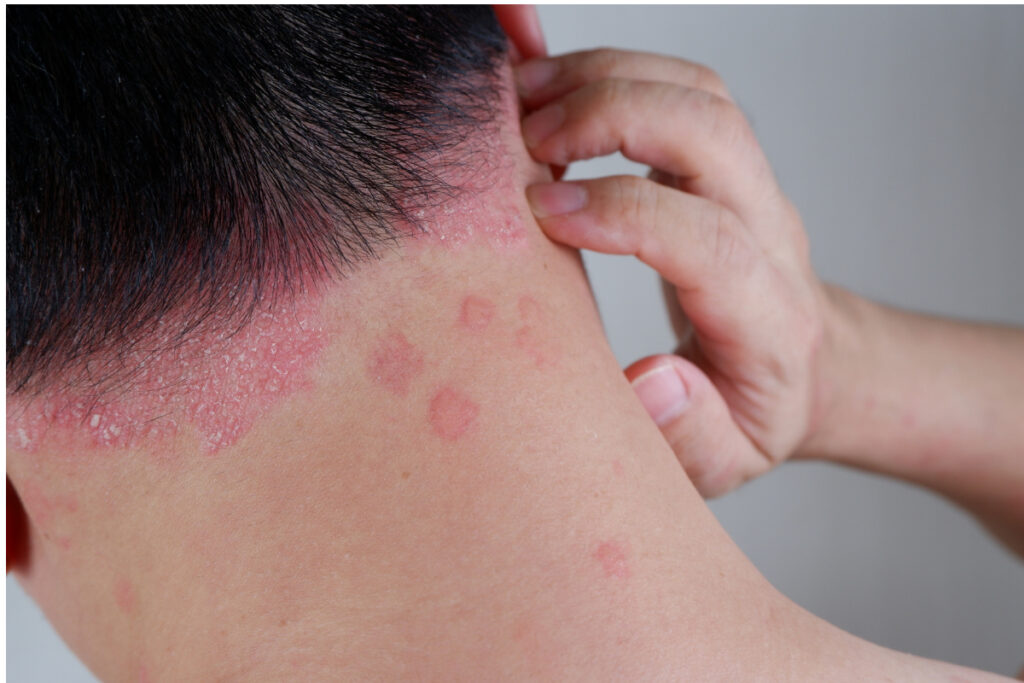Scalp Psoriasis Symptoms and Treatment
Scalp psoriasis is a common type of psoriasis that affects the skin on the scalp. It is characterized by red, inflamed patches of skin covered with silvery-white scales. Scalp psoriasis can range in severity from mild to severe.
The exact cause of scalp psoriasis is not known, but it is thought to be an autoimmune disorder. This means that the body’s immune system mistakenly attacks healthy skin cells. The rapid buildup of new skin cells on the scalp leads to the characteristic scaly patches.
Scalp psoriasis can be triggered by a number of factors, including:
- Stress
- Infection
- Medications
- Skin injuries
- Family history
Symptoms of scalp psoriasis:
- Red patches: Scalp psoriasis typically presents as raised, reddish patches of skin on the scalp. The patches can be small or large and may appear in different shapes.
- Scaling: The affected areas often have a buildup of thick, silvery-white scales. These scales can flake off and resemble dandruff.
- Itching and discomfort: Scalp psoriasis can be itchy and may cause a feeling of tightness or discomfort on the scalp.
- Dryness and cracking: The affected skin on the scalp may become dry, leading to cracking or bleeding in severe cases.
- Hair loss: In some cases, scalp psoriasis can lead to temporary hair loss or thinning due to damage to the hair follicles. However, hair usually regrows once the condition improves.
Scalp Psoriasis Images:






Causes of scalp psoriasis:
- Autoimmune response: Scalp psoriasis, like other forms of psoriasis, is believed to be caused by an abnormal immune response. The immune system mistakenly attacks healthy skin cells, triggering an accelerated growth cycle that leads to the rapid production of new skin cells.
- Genetic factors: There is a genetic component to psoriasis, and individuals with a family history of the condition are more likely to develop scalp psoriasis.
- Triggers: Various factors can trigger or worsen scalp psoriasis, including stress, certain medications, hormonal changes, infections, cold weather, and injuries to the scalp.
Diagnosis of scalp psoriasis:
- Scalp psoriasis is usually diagnosed based on its characteristic appearance and symptoms. A dermatologist can typically make a diagnosis by visually examining the affected scalp.
- In some cases, a skin biopsy may be performed to confirm the diagnosis or rule out other conditions that may resemble scalp psoriasis.
Scalp psoriasis treatment
If you think you may have scalp psoriasis, it is important to see a dermatologist for diagnosis and treatment. There is no cure for scalp psoriasis, but there are a number of treatments that can help to control the symptoms. Treatment options include:
- Topical treatments: These are the first line of treatment for scalp psoriasis and include medicated shampoos, creams, gels, foams, oils, or ointments. They may contain ingredients like corticosteroids, vitamin D-analogues, salicylic acid, tar, or retinoids. These treatments help to reduce inflammation, remove scales, and control itching.
- Phototherapy: In cases where topical treatments are not effective, light therapy can be used. UVB phototherapy or targeted phototherapy using excimer laser can be applied to the scalp to slow down the excessive skin cell production and reduce inflammation.
- Systemic medications: In severe cases or when scalp psoriasis is resistant to other treatments, oral or injectable medications may be prescribed. These systemic medications include methotrexate, cyclosporine, acitretin, or biologic agents. However, systemic medications are usually reserved for more widespread or severe psoriasis and require close monitoring due to potential side effects.
- Lifestyle measures: Maintaining a good scalp hygiene routine, avoiding triggers, and keeping the scalp moisturized can help manage scalp psoriasis. Regularly using a gentle shampoo and conditioner can help remove scales and keep the scalp clean. It is essential to avoid scratching or picking at the affected areas, as it can worsen symptoms and lead to infection.
The best treatment for scalp psoriasis will vary depending on the severity of your symptoms and your individual needs.
Here are some tips for managing scalp psoriasis:
- Use a mild, non-irritating shampoo.
- Avoid scratching the scalp.
- Keep the scalp moisturized.
- Use a leave-in conditioner to help prevent the scales from flaking off.
- Wear a hat to protect the scalp from the sun.
- Manage stress levels.
Can scalp psoriasis be cured?
There is no cure for scalp psoriasis, but it can be managed with treatment. The severity of scalp psoriasis can vary from person to person, and treatment options will depend on the individual’s needs. Some people may experience long periods of remission, while others may have more frequent flare-ups.
If you have scalp psoriasis, it is important to see a dermatologist to discuss treatment options. There are a number of effective treatments available, and the right treatment for you will depend on the severity of your condition and your individual needs.
How to prevent scalp psoriasis from spreading?
While it is not possible to prevent the development of scalp psoriasis entirely, there are measures you can take to help prevent its spread or worsening. Here are some tips to minimize the spread of scalp psoriasis:
- Maintain good scalp hygiene: Keeping your scalp clean and healthy is crucial in managing scalp psoriasis. Gently wash your hair and scalp regularly with a mild shampoo formulated for sensitive or psoriatic skin. Avoid using harsh shampoos or styling products that may irritate the scalp and exacerbate symptoms.
- Avoid scratching or picking: Scratching or picking at the affected areas can lead to skin damage and increase the risk of infection. It can also cause the scales to spread to other areas of the scalp. Try to resist the urge to scratch, and if needed, use a cool compress or apply a medicated ointment to soothe itching.
- Moisturize your scalp: Dryness can worsen scalp psoriasis symptoms, so it is important to keep your scalp moisturized. Apply a gentle moisturizer or emollient specifically designed for the scalp to help reduce dryness and scaling. Look for products containing ingredients such as salicylic acid, urea, or coal tar, which can help soften and remove scales.
- Avoid triggers: Identify and avoid any triggers that worsen your scalp psoriasis. Triggers can vary from person to person but may include stress, certain medications, alcohol consumption, smoking, and exposure to cold weather. By minimizing exposure to triggers, you can help prevent flare-ups and reduce the spread of the condition.
- Protect your scalp: Protect your scalp from extreme weather conditions, such as excessive sun exposure or cold temperatures, as they can trigger or worsen scalp psoriasis. Wear a hat or use sunscreen to shield your scalp from the sun’s harmful rays, and protect your head with a hat or scarf in cold weather.
- Manage stress: Stress can contribute to the worsening of psoriasis symptoms, including scalp psoriasis. Find healthy ways to manage and reduce stress levels through relaxation techniques, exercise, hobbies, or seeking support from friends, family, or professionals.
- Follow your treatment plan: If you have been diagnosed with scalp psoriasis, it is essential to follow the treatment plan prescribed by your dermatologist. Consistent use of prescribed topical treatments, such as medicated shampoos or creams, can help control symptoms and prevent the spread of scalp psoriasis.
It is important to note that scalp psoriasis is a chronic condition that may require ongoing management. Regularly consult with your dermatologist or healthcare provider for guidance on managing your scalp psoriasis and adjusting your treatment plan as needed.
Final thoughts
It is important for individuals with scalp psoriasis to consult a dermatologist for an accurate diagnosis and personalized treatment plan. The dermatologist will consider the severity of the condition, individual preferences, and response to previous treatments to determine the most suitable treatment approach. Regular follow-up visits are essential to monitor the progress and make any necessary adjustments to the treatment plan.
Reference:
- https://dermnetnz.org/topics/scalp-psoriasis
- https://www.webmd.com/skin-problems-and-treatments/psoriasis/scalp-psoriasis
- https://www.psoriasis.org/scalp/
